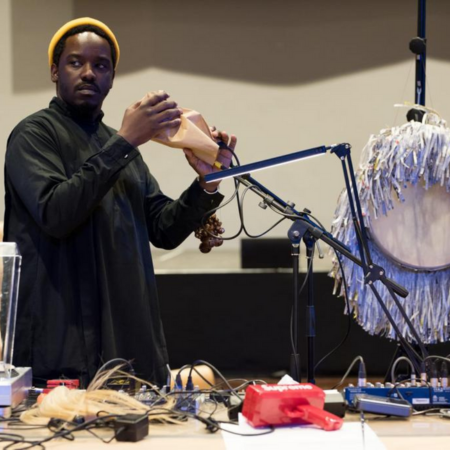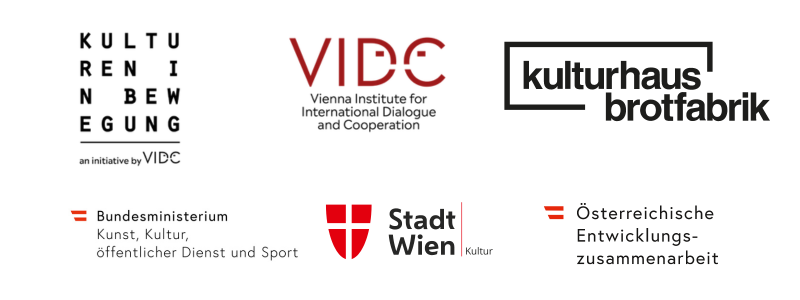Performance / Clišhé Träsh Warm-up
by Masimba Hwati & Mihret Kebede
- curated by Negin Rezaie
31.05.2023
Entrance 19:30, start 20:00
Kulturhaus Brotfabrik
Absberggasse 27/3, 1100 Wien
Admission: Pay as you can!* € 5, € 10 oder € 15
"The Economy of Presence" explores forms of resistance and irony against stereotypes and clichés. Artists Masimba Hwati, Mihret Kebede, Princess Esohe and Whitney Akpetsi create an installation of sound and silence, of language and muteness, and invite the audience to interact with their installation. These interactions will be integrated into the poetic soundscape created by the performers.
This event is a warm-up event for the CLIŠHÉ TRÄSH Festival taking place on October 6 and 7 at Brotfabrik Vienna. The events are each curated by a forum member and deal with clichés and stereotypes in a humorous and ironic way. Our goal is to uncover the structures behind them and, at best, destroy them.
Concept & Artists
Concept by Masimba Hwati & Mihret Kebede
The act of reading a foreign language out loud to an audience who can not understand it might sound ridiculous but is a form of refusal and resistance. Further exotifying a foreign language or presence is a stereotype /cliche that needs to be troubled with such artistic mediation. This performative intervention reclaims a space where knowledge is often circulated with advanced languages and texts that often utilize technological advancements to disseminate certain ideologies and world views. In this case, a cliche can be a sword of resistance for others in a process of self-care. In the process of a desired political change, every revolution starts in/with/around/above and below silence. ''Silence is not a void space’’ rather has an agency that enables communication. In this intervention what is about to happen has already happened. Refusal is self-preservation, economizing one’s sound and word can be a product of fear but can also produce fear. The theme is complex, and it is not a matter of either/or, neither/nor, but rather a specific position of refusal, a refusal to be read, to be intelligible to be, categorized. This performance aims to invite and inspire the audience to think of silence as an alternative form of resistance. Silence is not an absence of speech act, it is a presence and authenticity. The perpetual stereotype and cliche are that oppressed people will be angry and will speak out, this cliche trap of words and strategy. Zora Neal Hurston once said "The white man is always trying to get into somebody else's business. All right, I'll set something outside the door of my mind for him to play with and handle. He can read my writing but he sho' can't read my mind. I'll put this play toy in his hand, and he will seize it and go away. Then I'll say my say and sing my song."
Masimba Hwati was born in Harare, two years following the second chimurenga against the British crown. Talk about sonic envelopes, In that year Juluka released ‘Scatterlings of Africa’ a hit song inspiring phantasms of exotic gaze(s) against a backdrop of a brutal Apartheid system in South Africa. In this year also, Toto released the song Africa. This is also the year Michael Jackson released the song Human nature and Bhundu boys released the single Uneshuwa here? Later that year going into the next, The new Zimbabwean Government unleashed ‘Gukurahundi’ The ethnic cleansing genocide on the southern part of the country. Masimba’s work is preoccupied with sound, listening, micro-politics, resistance and negotiation. He’s created projects in Harare, Detroit, Johannesburg, Capetown, Blackburn, UK,Vienna,Weimar, South Carolina, Leeds UK and Nova Scotia.
More information: @masimbahwati
Mihret Kebede is a multi-disciplinary artist and poet, a co-founder of Tobiya poetic Jazz, Netsa Art village artists collective, and Addis video art festival. She graduated from Addis Ababa University School of Fine Arts and Design in painting with distinction in 2007 and has earned her MA in arts from the same school in 2016. She has received a certificate award of recognition in 2013 from the Ministry of Culture and Tourism, Ethiopia. Mihret has participated in several local and international art exhibitions, workshops, poetry performances, art residencies, and collaborative art projects. Beyond her artistic practices, she is known for organizing local and international art events and festivals. Her poems and essays are included in the Wax and Gold: Poetry Jazz book Published by Institut für Raumexperimente/Studio Olafur Eliasson, Berlin and Tobiya Poetic Jazz, Addis Ababa. Her poems are featured in several publications including Washington square review Journal and the first-ever anthology of Ethiopian Amharic poetry in English, Songs We Learn from Trees ,Carcanet Press. Mihret is currently a Ph.D. candidate at the Academy of fine arts Vienna (Akademie der bildenden Künste Wien).
More information: linktr.ee/mihretkebede
This performance will be musically accompanied by Whitney Akpetsi & Princess ESOHE.
*Pay as you can!
Our price system: You decide what you can pay.
You can choose between: € 5, € 10 and € 15.
We want to offer you a fair and transparent price model, the price does not represent the value of the production, but is based on your financial possibilities. What is expensive for some, can be easily affordable for others. We invite you to decide for yourselves what contribution you are willing and able to make. Here you have the possibility to support easily and unbureaucratically with a higher solidarity contribution those for whom a performance visit is a real extra effort and perhaps would not be possible without the optional price system.
The entrance fees benefit the artists, who are paid according to the Fair Pay Scheme.
Cash only payment at this event! Limited number of seats. Admission: 7.30 pm, start 8 pm
Curatorial Statement
Kulturinbewegung, as an art and cultural institution, recognizes the challenges faced by people of color (POC) and immigrants due to systemic barriers and stereotypes. In response to these issues, Kulturinbewegung has undertaken the initiative of addressing them through art and cultural events. The aim is to foster equity, equality, and justice within society, ultimately working towards the development of a more inclusive and harmonious community. This endeavor acknowledges that the practice of freedom is a continuous effort, and true freedom cannot be attained until it is experienced by all individuals.
One such initiative by Kulturinbewegung is the organization of a festival called "CLIŠHÉ TRÄSH." This festival aims to challenge the prevailing clichés and stereotypes that persist in society against POC and immigrants. As a prelude to the festival, I curated an event that featured exceptional artists. The theme of this event revolved around the concept of the "economy of presence" and the use of silence as a form of resistance. Personally, I sought to express the idea that excessive explanations and constant validation are unnecessary. I emphasized that regardless of how much we articulate ourselves and present our ideas, recognition is often elusive, particularly when our messages adhere to predefined and stereotypical expectations. The struggle for recognition without resorting to over explanation is a daily battle for many of us.
In our performance, we ventured into the realm of experimental sounds, aiming to create a contemporary mode of communication that transcended conventional expectations. Mihret Kebede, a multidisciplinary artist, poet and performance artist, employed humor in her poetry to highlight the difficulties encountered in seeking understanding. She devised a new language using symbols such as boxes and dots as a means of communication. Together, we explored novel linguistic forms and sounds, accompanied by a video projection of the Ethiopian landscape overlaid with box poetry. This concept drew inspiration from the Ethiopian protest tradition, where silence is employed as a form of resistance against colonialism.
As the performance concluded, we invited the audience, irrespective of their background, race, or gender, to convey their silent experiences by depositing them into a jar. Masimba Hwati ,a multidisciplinary artist then sealed the jar, symbolizing the preservation of these narratives. This act underscored the significance of giving voice to silenced experiences and creating a space for their recognition and acknowledgement.

![[Translate to English:] [Translate to English:]](https://www.kultureninbewegung.org/fileadmin/user_upload/Combination_of_two_pictures_Masimba__c_Konstantin_Bayer_2021_and__c_Mihret_s_poem_x450.png)

![[Translate to English:] [Translate to English:]](https://www.kultureninbewegung.org/fileadmin/user_upload/450x_Mihret_Kebede__c_Dirk_Skiba.png)
